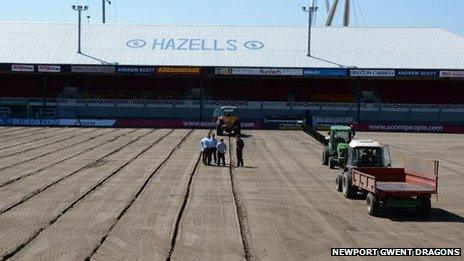Warning over Rodney Parade pitch in Newport
- Published

Work at Rodney Parade took place in the close season
There are concerns about future pitch problems at the home of Newport's top football and rugby teams after major improvements could not be completed.
Work to improve drainage under the Rodney Parade pitch took place over the close season but the hot weather left one half too dry to finish the work.
It must now be left until May because Newport County have already kicked off their Football League campaign.
Rugby sides Newport Gwent Dragons and Newport RFC also play there.
The three teams jointly financed improvements to the drainage and irrigation of the pitch.
It was successfully carried on the southern side of the pitch but the northern half - traditionally the worst affected part - remains incomplete.
The turf was in immaculate condition for County's long-awaited return to the Football League but had started to cut up by the final whistle of the 4-1 win over Accrington Stanley.
Mark Jones, head of operations at Rodney Parade, admits it could be a sign of things to come.
"Some people say I'm being pessimistic, I'd say I'm being realistic - it's better that everyone can plan for any future problems now," he said.
"Let's be clear, we don't have a problem at the moment.
"Justin Edinburgh (Newport County manager) said the surface played wonderfully for them [for the first home game of the season] but it scuffed up a tiny bit, and that's after only one football match.
"We have over 70 football and rugby matches planned between now and May, when we can complete the drainage work."
Gullies have been laid beneath the turf at 5m (16ft) intervals for the entire length of the pitch.
But while these have been connected by trenches in the southern half, ironically the sun rather than the rain prevented the same job being completed in the normally boggier northern half.
"You wouldn't credit it would you?" he said. "How often can you say in Wales that it's been too dry to complete a construction job?
"But that's what happened. When the contractors came to lay the cross channels for the northern half the soil was too dry and was collapsing in on them."
Mr Jones said the work was further complicated by the need to have the pitch re-laid in time for the earlier than usual start to the Football League calendar.
As further work cannot be carried out until next summer because it involves removing the playing surface, efforts have been made to help deal with the problems in the meantime.
Mr Jones said as soon as the problem became clear, the ground staff invested in a "shock-waving" machine.
He added: "We can use it to drive 10-inch holes into the grass which will help allow surface water to run off more quickly into the lengthways channels which are already in place.
"That will certainly help, but to a certain extent we're in the laps of the gods as so much depends on the weather we have over the winter."